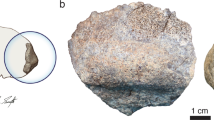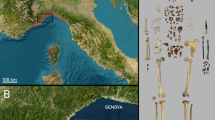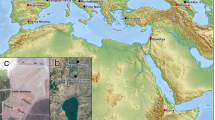Abstract
Five hominid specimens, including two well preserved crania, early artefacts and a rich collection of vertebrates have been recovered from Plio-Pleistocene deposits near Lake Rudolf. Some of the artefacts were located in situ in a horizon that has since been reliably dated with a new isotopic technique at 2.61±0.26 million years. They constitute the oldest known in situ dated unequivocal artefacts.
This is a preview of subscription content, access via your institution
Access options
Subscribe to this journal
Receive 51 print issues and online access
$199.00 per year
only $3.90 per issue
Buy this article
- Purchase on Springer Link
- Instant access to full article PDF
Prices may be subject to local taxes which are calculated during checkout
Similar content being viewed by others
References
Leakey, R. E. F., Butzer, K. W., and Day, M. H., Nature, 222, 1132 (1969).
Maglio, V. J., Nature, 225, 328 (1970).
Author information
Authors and Affiliations
Rights and permissions
About this article
Cite this article
LEAKEY, R. New Hominid Remains and Early Artefacts from Northern Kenya: Fauna and Artefacts from a New Plio-Pleistocene Locality near Lake Rudolf in Kenya. Nature 226, 223–224 (1970). https://doi.org/10.1038/226223a0
Received:
Issue Date:
DOI: https://doi.org/10.1038/226223a0
This article is cited by
-
40Ar/39Ar age spectra from the KBS Tuff, Koobi Fora Formation
Nature (1981)
-
K–Ar age estimate for the KBS Tuff, East Turkana, Kenya
Nature (1980)
-
The Karari Industry: Early Pleistocene archaeological evidence from the terrain east of Lake Turkana, Kenya
Nature (1976)
-
40Ar/39Ar dating of the KBS Tuff in Koobi Fora Formation, East Rudolf, Kenya
Nature (1976)
-
New hominid fossils from the Koobi Fora formation in Northern Kenya
Nature (1976)
Comments
By submitting a comment you agree to abide by our Terms and Community Guidelines. If you find something abusive or that does not comply with our terms or guidelines please flag it as inappropriate.



